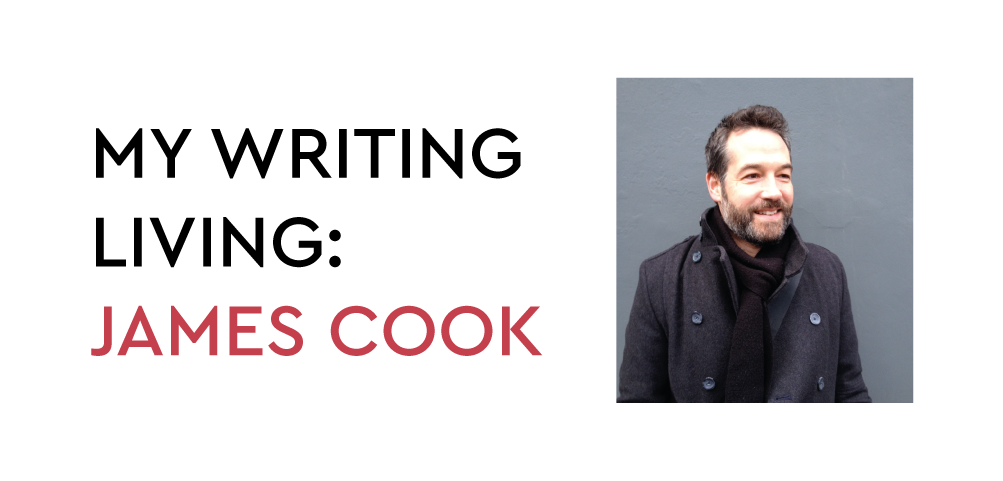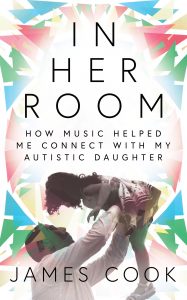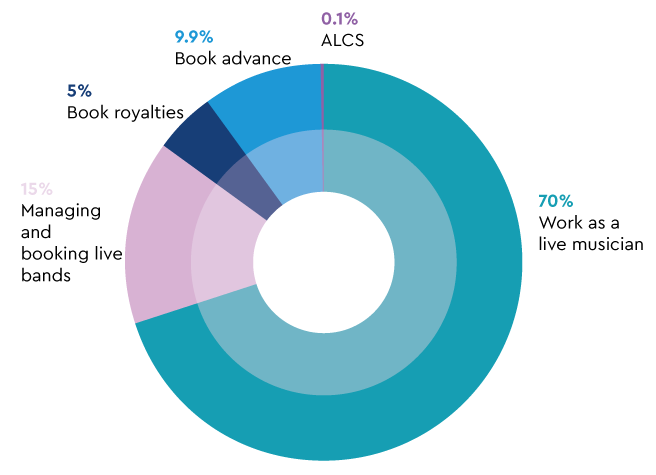MY WRITING LIVING: JAMES COOK

James Cook tells us how his long career in the music industry inspired a move into writing, and provided the material for his first two books.
While James Cook has been earning a living from words for much of his working life, it is only recently that he has done so by writing books. Now in his early 50s, James started out as a musician and songwriter, co-founding 1990s band Flamingoes with his twin brother Jude. His first book Memory Songs which came out in 2018 was directly inspired by the Flamingoes period, and is a personal exploration of the popular music that shaped the 90s. His second book, In Her Room: How Music Helped Me Connect With My Autistic Daughter is a moving portrait of his young daughter Emily who has non-verbal autism, and how he forges a relationship with her through playing music.
 James has spent the past two decades supporting his writing by working as a self-employed live musician, playing evening gigs in London restaurant venues. “That’s been the backbone of my income. And for a long time that worked well because having a night job doesn’t eat up the writing day. But it does mean you have to burn the candle at both ends – I’d typically get home at 12.30am and then wake up at 6am to write.”
James has spent the past two decades supporting his writing by working as a self-employed live musician, playing evening gigs in London restaurant venues. “That’s been the backbone of my income. And for a long time that worked well because having a night job doesn’t eat up the writing day. But it does mean you have to burn the candle at both ends – I’d typically get home at 12.30am and then wake up at 6am to write.”
In March 2020 however, all such gigging ceased when restaurants were forced to close due to COVID-19. “It quickly became clear that the job I was doing had been cancelled, and even outlawed in some countries: in Germany I believe it’s now illegal to sing in public places because of the dangers of airborne droplets.” While James was fortunately eligible to claim the government’s emergency grant for the self-employed, his was an income stream that was already becoming less reliable. “Live music in London has been declining for years, regardless of the pandemic, and of course now the situation is parlous”, James tells me. It’s a fresh blow, given the extent to which creators in the music industry have become increasingly reliant on live performance, in the face of the minuscule royalties that most now earn from music streaming platforms such as Spotify.
As Memory Songs relates, it’s a far cry from the 1990s heyday of Flamingoes when, says James, “for brief period we had a publishing deal and I was being paid to write songs. I remember getting a few quite nice cheques from the Performing Right Society. And we sold 20,000 albums worldwide.” At the time it was “an amazing feeling”. Fast forward two decades however and a living from music has become much less viable. So James has made conscious move away from songwriting and into other genres of writing. And actually this was a homecoming of sorts: while still at school, he wrote a novel and some short stories thanks to Mr Wood, an inspirational English teacher he describes as “one-man teaching revolution.” At the time, both James and his brother Jude were readers with “literary ambitions. But because it was the 1980s and music was so ascendant, we thought: let’s write songs instead!”
I loved working with [Unbound], especially as I’d had such an unhappy creative experience with my record label. The publishing world is so much gentler.
The inspirational Mr Wood went on to forge his own career as a bestselling writer of study guides, whilst brother Jude is now a published novelist. While James admits to having “50k words of a bad Nick Hornby-esque novel in a drawer somewhere”, it was to non-fiction that he turned, working on the idea for Memory Songs for 15 years or so before getting a publishing deal with Unbound. “I loved working with them, especially as I’d had such an unhappy creative experience with my record label. The publishing world is so much gentler.”
James’ average income sources:

But James’s new identity as a writer has not been forged without significant challenges. His second book, In Her Room came out early April 2020, a dreadful time to be publishing anything, let alone such a personal and heartfelt work. “It was just heart-breaking. This book about my daughter took me five years and was written in blood. It was also designed to raise awareness of autism so all the broadsheets had commissioned features, all the Sundays were going to run something. And one by one, all the features were decommissioned because no one was buying papers and in any case everything had to have a COVID angle. No-one’s mind was on anything else, let alone disability and trauma.”
“Looking back, there was a sort of gallows humour to the whole episode because it was a kind of parody of the classic writers’ anxiety dream”, adds James, wryly. “Last night I dreamt that in publication week there was a global pandemic. We were all locked down and bookshops were shut, and Amazon stopped selling books for a while. Oh, wait…” Six months on, he now feels more sanguine about the experience and plans to keep promoting the book wherever he sees a suitable opportunity. “I’m not a natural hustler but people who have read In Her Room have reacted so well to it. That has spurred me on: I’ve just done an interview for the National Autistic Society’s magazine, for example.”
Looking back, there was a sort of gallows humour to the whole episode because it was a kind of parody of the classic writers’ anxiety dream
And despite all the ups and downs of the past months, James who is now at work on a third book has no intention of quitting his new career which also encompasses essays and journalism as well as published books. “I’ve now got an armada of freelance options that I’m going to try out. For the last three years I’ve been copyediting – unpaid – for literary magazines, including Litro which publishes some amazing writers. I was a commissioning editor there too and I enjoyed that. People have told me I’m good at this kind of work too. So I’m going to try and upskill and see if I can monetise it. Even though words seem to worth less and less these days, going back to live music might not be an option. Maybe lockdown has given me the breathing space to think about how I really want to earn a living.”
James Cook is a writer and journalist based in London. His first book, Memory Songs was published by Unbound in 2018; his second, In Her Room: How Music Helped Me Connect With My Autistic Daughter, by Bonnier Books UK in 2020. His short fiction has appeared in the anthology Vagabond Holes, and his journalism and essays have appeared in the Guardian, the TLS, and the Saturday Telegraph, among others.
@jamesbpcook/jamesbpcook.blogspot.co.uk
Interview by Caroline Sanderson
